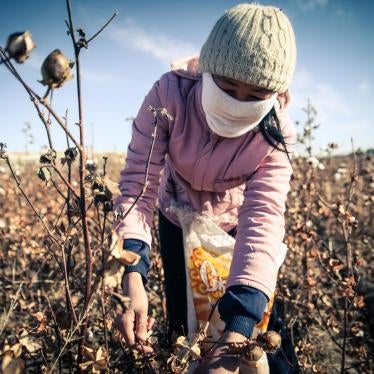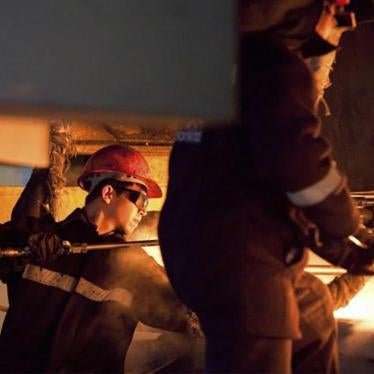Turkmen authorities must investigate the suspicious death in custody this week of an independent journalist and human rights defender, and ensure the safety of her children, Human Rights Watch said today.
Ogulsapar Muradova, 58, was a journalist for Radio Free Europe/Radio Liberty and was also associated with the Turkmenistan Helsinki Foundation, a Bulgaria-based nongovernmental organization that monitors and reports on human rights conditions in Turkmenistan. She was convicted last month on politically motivated charges of illegal weapons possession.
“Muradova should never have been in prison in the first place,” said Holly Cartner, Europe and Central Asia director for Human Rights Watch. “Her death was more than a tragedy – it may have been a crime.”
Human Rights Watch called on the international community to press for an international, independent forensic examination of Muradova’s body as a matter of urgent priority in order to establish the cause of her death.
Muradova’s son, Berdy Muradov, learned of his mother’s death yesterday, when officials summoned him to the morgue to collect his mother’s body. Authorities at first refused to show him Muradova’s body and threatened unspecified consequences if he did not stop asking to see the body. When his mother’s body was finally delivered to Muradov’s home, he noticed a wound on her head.
Muradova was arrested on June 18, together with Amandurdy Amanklychev and Sapardurdy Khajiev, who are also associated with the Turkmenistan Helsinki Foundation. The government at first implied that their human rights and journalism work were instead acts of subversion. In late August a court convicted all three of illegal weapons possession in a two-hour closed trial and sentenced Muradova to six years in prison, and Amanklychev and Khajiev to seven years each.
Muradova was held incommunicado throughout her detention, as are Amanklychev and Khajiev to this day. Human Rights Watch and other human rights organizations repeatedly voiced concerns about the risk of torture and ill treatment they face in custody.
“We are profoundly concerned about the safety of Amanklychev and Khajiev,” said Cartner. “The international community must call for their immediate release, and make clear that there will be serious consequences should any harm come to them.”
Human Rights Watch also expressed concern about reports of intensified surveillance and intimidation of Muradova’s family in connection with her death – including by preventing contact by relatives with her son and daughters – and called on the international community to ensure their safety and well-being. Following Muradova’s arrest in June, Turkmen police detained Muradov and two of his sisters, Sana and Maral, after they told officials of the Organization for Security and Cooperation in Europe (OSCE) in Ashgabat that their mother had been arrested. They were subsequently released.
Human Rights Watch urged the newly established United Nations Human Rights Council, which convenes in Geneva for its second session next week, to take up Turkmenistan for critical scrutiny. It also criticized the European Union for not staying true to its human rights principles by pursuing an interim trade agreement with the Turkmen government.
“Muradova’s death shows just how absurd it is of the EU to even contemplate such an agreement with the Turkmen government,” said Cartner. “Instead of seeking to upgrade relations with this stronghold of repression, the EU should redouble efforts to press the authorities to make concrete and meaningful progress in human rights.”
Earlier this week, the European Bank for Reconstruction and Development (EBRD) published its new, strongly critical country strategy for Turkmenistan. The strategy reaffirmed the bank’s suspension of any public sector investment over human rights concerns, and made clear that it would engage in the private sector only on the condition that the proposed projects were independent of the government and that individual government officials would not benefit from them. The strategy concluded that EBRD was “seriously concerned by Turkmenistan’s continued failure to take any measures which would indicate a willingness to make progress towards multi-party democracy, pluralistic society and a market-based economy,” and found “no evidence of improvement.”
Background
Turkmenistan, ruled by President-for-life Saparmurat Niazov, remains one of the most repressive and closed countries in the world. The government tolerates no dissent, allows no media or political freedoms, and has driven into exile or imprisoned political opposition, human rights defenders and independent journalists. Dissidents are treated as criminals and are subject to internal exile, forced eviction from their homes and confiscation of their personal property. Several have been forcibly detained in psychiatric hospitals.
The government has banned opera, ballet, circus, the philharmonic orchestra and non-Turkmen cultural associations. Religious believers, particularly followers of faiths other than Sunni Islam and Russian Orthodoxy, have faced criminal prosecution, police beatings, deportation and, in some cases, demolition of their houses of worship.
Turkmenistan is a country whose leadership is sending it backwards in social and economic development. The country is rich in natural gas, but most of the population lives in grinding poverty. In 2004, President Niazov was reported to have ordered the dismissal of an estimated 15,000 healthcare workers and replaced them with military conscripts. In 2003, the government limited compulsory education to nine years, and it has cut back drastically on state-funded healthcare.






